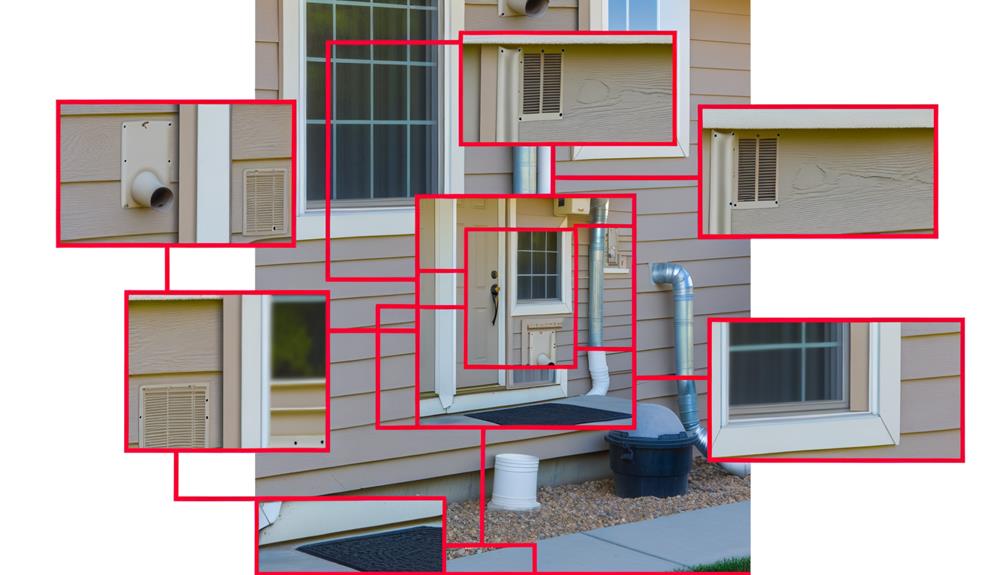Table of Contents
To rodent proof your house, start by sealing entry points using steel wool, mesh screens, or caulk to block all openings rodents can squeeze through. Secure food in metal or hard plastic containers, store it high, and clean up spills promptly to deter pests. Utilize strong containers for dry goods and pet food, keeping them elevated. Trim bushes, trees, and maintain a tidy garden to discourage rodents. Use natural repellents or barriers for added protection. Implement traps strategically with baits like peanut butter. Finally, consider professional pest control for severe issues. Minimize hiding spots and maintain cleanliness for a rodent-free home.
Key Takeaways
- Close all holes using steel wool, wire screens, or caulk to block entry.
- Keep food in metal, glass, or strong plastic containers to protect it.
- Put food storage containers off the ground to avoid easy access.
- Clean regularly to avoid leaving food out that attracts rodents.
- Use things like peppermint oil or barriers to keep rodents away.
This approach is straightforward and focuses on practical steps to prevent rodents from entering your home. By sealing entry points and securing food, you make your space less inviting to them. Regular cleaning helps minimize attractions that might bring them in. Using natural repellents can also discourage them from coming closer. Remember, it’s all about making your home a fortress against these unwelcome guests.
Identify Entry Points For Effective Rodent Proofing

To keep rodents out, start by checking your home for any small openings. Look closely around pipes, vents, windows, and doors. Don’t forget to examine the foundation, walls, and roof for cracks or openings. Remember, rodents can squeeze through tiny spaces, so be thorough.
Also, check for gaps in insulation. These spots can be easy to miss but are perfect for rodents looking for a cozy home. These gaps can let heat out, costing you money, and invite rodents in. Sealing these spots with steel wool, mesh screens, or caulk can make a big difference in keeping your home rodent-free.
Keep the language simple and direct. Look everywhere – under, around, and inside your home for any cracks or gaps. Use materials like steel wool or caulk to close up these spots. This not only saves you on heating costs but also keeps unwanted furry visitors away.
Secure Food Sources
To keep your food safe from rodents, it’s important to store it right and clean regularly.
Choose strong containers like metal, glass, or hard plastic for your dry foods, pet food, and birdseed.
Putting your food up high and making sure the containers are closed tight will make it hard for rodents to get to them and cause problems.
Store Food Properly
To keep rodents out of your home, it’s important to store your food the right way. Use containers made of metal, glass, or strong plastic for dry food, pet food, and birdseed. These materials stop rodents from getting in. Make sure the containers are airtight. Cardboard boxes won’t work because they’re like a welcome mat for rodents to nest. Put food containers on shelves or pallets, not on the ground. This helps prevent contamination and makes it harder for rodents to get to the food.
For items you only use sometimes, like seasonal decorations or extra supplies, store them safely too. Choose containers that rodents can’t get into. The main goal is to keep your food safe and keep your home free from rodents.
Clean Regularly
To keep your home free from rodents, it’s important to clean regularly. Ensure that any food spills are cleaned up quickly. This step helps remove what might attract rodents, making your home less appealing to them.
Store all your food in containers with tight lids, preferably made of plastic, metal, or glass. This keeps rodents out. Also, don’t leave pet food out. Instead, store it properly after each feeding. For trash, use sturdy containers made of thick plastic or metal. Make sure to take out the trash often and clean the containers to avoid attracting rodents.
It’s a good idea to inspect your home regularly for signs of rodents. Sometimes, bringing in a professional can give you the best protection against these pests. By following these steps, you’re on your way to making your home a place where rodents are less likely to visit. Remember, a little effort goes a long way in keeping rodents away.
Seal Pantry Items

Checking your pantry for rodents is important to keep your home pest-free. To protect your food, use strong containers made of metal, glass, or thick plastic for storing dry foods, pet food, and birdseed. These materials stop rodents from getting into your food. Don’t use cardboard boxes; rodents can easily chew through them.
Choose tough containers instead and place them off the floor on shelves or pallets to prevent rodents from making a home there. Always check your storage areas and containers to ensure they’re secure against rodents.
Maintain Cleanliness
To keep your home free from rodents, it’s important to clean regularly. This means wiping down surfaces and sweeping or vacuuming floors to get rid of food bits that attract these pests. Make sure to clean up any spills or crumbs right away. This makes your home less inviting to rodents looking for a snack.
Also, try to keep things off the floor. This not only makes your space look neater but also takes away hiding spots for rodents. A messy home can be a playground for these critters, making it harder to keep them out. By keeping your home tidy and putting things away, you reduce the chances of rodents making themselves at home.
In short, clean often and keep your space organized. This will help keep rodents at bay. It’s not the most exciting task, but it’s better than having unwanted guests.
Landscape Management

Check the edges of your property for tall plants or bushes where rodents could hide. Managing these areas well is key to keeping rodents away from your home. Cut back any tree branches or bushes near your house to remove places where pests might hide.
Don’t let plants touch your home’s foundation, as this makes it easier for rodents to get inside. It’s better not to have bushes right against your house, even if it looks nice, because it can attract rodents. Make sure to mow your lawn regularly and keep it neat. This helps get rid of spots where rodents could nest, making your yard less welcoming to them.
Choosing where to place plants carefully and keeping your garden tidy can make a rodent infestation less likely. By following these tips, you’re making your home a place where rodents are less likely to hang out.
Implement Deterrents
Boost your plan against rodents by using natural repellents and building barriers. Use smells like peppermint, clove, or hot sauce to keep mice away. They don’t like these scents and will likely stay out. Make your own barriers with materials like sheet metal, mesh, or caulk to cover any openings where rodents might enter. This approach keeps them out and makes your home stronger.
Make sure to store food in containers that are tough and can’t be chewed through, like those made from plastic, metal, or glass. This makes your home less tempting to rodents. Keeping your house clean and free from food scraps removes possible food sources and hiding places for rodents. Also, take care of your garden to reduce places where rodents might hide or build nests, keeping them further from your home.
Install Traps and Baits

To fight off rodent problems in your house, it’s crucial to set up traps and baits correctly. First, pick the type of trap you want to use: snap, electronic, or live traps are all good options. Place these traps in areas where you’ve seen rodents or signs of their activity.
Use appealing bait, like peanut butter, to lure them in. It’s important to check these traps often and keep them clean for them to work well. This straightforward approach can help you tackle the issue effectively, without making it too complicated.
Choosing Effective Traps
To get rid of mice in your house, it’s important to pick the right traps and bait. Snap traps work well and can be baited with foods like peanut butter or bacon that mice find hard to resist. Knowing where mice like to go is important for placing traps effectively. Set traps along walls and in areas where you see mouse droppings or chew marks.
For a modern approach, try electronic traps. These give mice a quick, humane electric shock to kill them. Use several traps in different spots to catch more mice. Check the traps often and remove any mice you catch to keep your house mouse-free. Staying on top of things and choosing the right traps and bait are crucial for controlling mice.
Safe Bait Placement
To address rodent issues, start by strategically placing traps and baits near areas of high rodent activity, such as along walls and entry points. Utilize bait stations designed for safety around children and pets, ensuring they are inaccessible to avoid accidents. Opt for baits formulated specifically for rodents. Regularly monitor and replenish bait stations as required to maintain effectiveness. For significant infestations, consider consulting professional pest control services, as they can customize their methods to suit your needs, effectively safeguarding your home from rodents.
Keep it simple: put traps and bait where rodents hang out, like along walls and entryways. Know your enemy—understand rodent habits to outsmart them. Use child and pet-safe bait stations, and pick the right bait. Regular checks and refills are key. For tough cases, a pro might be your best bet. A smart bait strategy is a solid defense against these pesky invaders.
Monitoring and Maintenance
Place traps and baits where you see the most rodents. Make sure to check them often. This helps you know if they’re working. If a trap or bait looks old or doesn’t work, replace it.
Rodents are clever and can pop up in new places, so you might need to move your traps around. Keep a list of where you’ve put traps and what you’ve caught. This helps you see patterns and get better at catching them.
Being alert and keeping your traps in good shape is key to managing rodents at home. Keep it simple, stay focused, and you’ll be on top of the rodent situation.
You may also enjoy reading this article
Was This Article Helpful?
- Please provide feedback and comments to help us improve our content.
- Share your experiences and any additional tips you have for dealing with pests.
Share this Post


